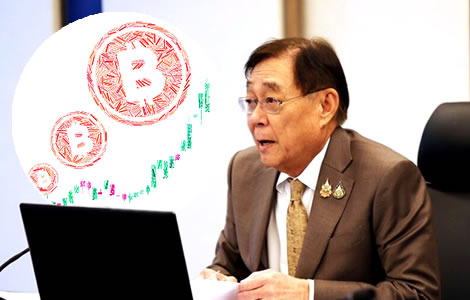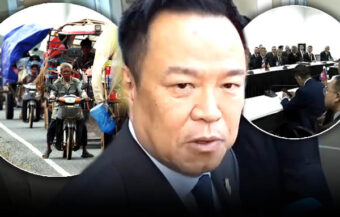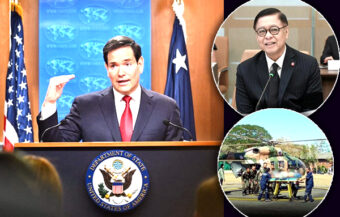Finance Minister Pichai proposes raising Thailand’s inflation rate in talks with the central bank, warning that prolonged low inflation could risk a systemic economic crisis. The move, aimed at boosting growth, may clash with the Bank of Thailand’s stance.
Thai Minister of Finance Pichai is to meet the Bank of Thailand to propose raising Thailand’s inflation policy rate. The deputy prime minister, who heads the government’s economic team, warns that prolonged low inflation comes with risks of a systemic crisis to the economy. Mr. Pichai argues that higher inflation may help boost the country’s flagging economic growth. However, his thinking may be at odds with that of Bank of Thailand Governor Sethaput Suthiwartnarueput, and consequently, widen the chasm between the central bank and the government.

Deputy Prime Minister and Finance Minister Pichai Chunhavajira has announced his ministry will meet with the Bank of Thailand (BOT). In short, the summit’s purpose is to discuss revising the country’s inflation rate framework.
Certainly, the current inflation target, set between 1-3% per year, has been in place for a long time. Pichai believes it is time for an upward adjustment.
Significantly, he sees it as essential to support Thailand’s economic growth. While Thailand’s economy has been growing since 2021, it is at a very moderate pace.
In particular, the kingdom’s economy, Southeast Asia’s second-largest, has lagged behind its regional peers. The reasons are numerous, including demographic changes and a record-high private sector debt load.
Ministry of Finance and Bank of Thailand to meet and review the inflation target range for 2025
The primary focus of the proposed meeting between the Ministry of Finance and the Bank of Thailand will be inflation. In particular, it aims to review and adjust the inflation framework for 2025.
Presently, the central bank’s target range is between 1% and 3% per annum. Certainly, this year the full year’s inflation figure will be something close to 1%. It comes after the kingdom’s inflation rate only went positive in April.
For instance, July’s Consumer Price Index (CPI) was 0.83% compared to 0.61% the month before.
Notably, in the first seven months of 2024, headline inflation was only 0.11%. Nonetheless, Thailand’s economy is so troubled that consumer confidence has fallen for six months straight.
In summary, it was 56.5 points in August, down from 57.7 in July 2024. The average from 1998 to 2024 has been 74.19 points, with the lowest being 39.6 points in August 2021 during the pandemic’s aftermath.
Thailand’s consumer confidence levels have been declining, reaching the lowest point since the pandemic
Before that, the peak was in December 2003, when it hit 112.4 points, during the heyday of the Thaksin Shinawatra era. Pichai argues that Thailand’s inflation rate has remained relatively low for an extended period.
At the same time, while it is beneficial for consumers in the short term, it could hinder long-term economic growth. He emphasises that a modest increase in inflation is necessary to stimulate the economy and ensure sustainable growth.
“We have already arranged a meeting about the inflation framework, and we have talked over the phone,” Pichai explained. “My position is that the government has a clear policy. Confidence is starting to improve, and the capital market is starting to come in.”
Pichai believes higher inflation will boost economic recovery and align Thailand with global trends
Pichai believes that with the Thai economy beginning to recover and gain momentum, now is the right time to accelerate growth efforts. According to him, an increase in inflation would help balance economic activities, ensuring that the economy continues to expand at a sustainable pace.
Pichai also highlighted the importance of aligning the country’s inflation policy with regional and global trends. As Thailand’s competitors and neighbouring countries adjust their economic policies, he believes it is vital that Thailand does the same.
An inflation rate that remains too low for too long could hamper growth. Certainly, in Pichai’s view, it could prevent the country from fully benefiting from the global economic recovery.
“Inflation has to go up a bit,” Pichai stated. “But it happens that our inflation is low. And if we look ahead, people will say that sometimes it is high. But we see that it has never gone up; it has always been low. So, it is time.”
Pichai suggests a balanced inflation rate to stimulate economic growth and support Thai exporters
He argued that maintaining a balanced inflation rate is the best course of action. In brief, it would support economic growth. In the longer term, he claims it would help Thai businesses remain competitive in the global market.
Certainly, it is hardly likely to benefit struggling Thai exporters. Indeed, the finance minister appears to be advocating on behalf of Thailand’s large corporations.
Many would benefit from higher inflation, which would conversely reduce the relative value of their balance sheet debt.
Pichai’s inflation proposal faces opposition from the Bank of Thailand, concerned about marginalised consumers
Undoubtedly, higher inflation will not benefit already marginalised Thai consumers.
Bank of Thailand boss: current economic thinking only benefits the large Thai business concerns
Last week, Thailand’s embattled Bank of Thailand chief argued strongly against prevailing economic wisdom.
The central bank boss suggested that Thai policy in the last two decades has mainly benefited wealthy corporations.
Despite opposition, Pichai insists inflation must be carefully managed to ensure balanced growth
Nonetheless, Pichai argues that inflation levels should be carefully managed and adjusted based on regional and international economic trends. Of course, in addition to Thailand’s own economic needs.
In his comments, Pichai acknowledged that while low inflation can seem beneficial to consumers, there are side effects. In brief, it presents challenges for producers and the economy as a whole.
He urged the public to consider inflation from both the consumer and producer perspectives. The finance minister emphasised that a well-balanced inflation rate would benefit both sides in the long run.
“Low inflation, buyers say it’s good, but sellers don’t like it,” Pichai noted. “Don’t forget, consumers will consume, but they will like it for a short while because producers will stop producing, goods will disappear from the market, and prices will rise.”
Pichai warns that low inflation may lead to economic shocks, pushing for a long-term strategy for inflation
His remarks underline the need for inflation to be maintained at a level that supports both production and consumption.
While low inflation can provide short-term relief to consumers, it can ultimately lead to supply shortages. After that, price spikes will occur if producers cannot sustain their operations under low-margin conditions.
Pichai warned that this scenario could result in a more significant economic shock if inflation is not managed appropriately.
Pichai underlined the need for a long-term strategy when it comes to inflation management. He noted that while short-term inflation concerns are understandable, a strategic, data-driven approach is required. In short, he insisted that this would ensure Thailand remains competitive on the global stage.
“We have to live together with inflation at an appropriate level,” Pichai said. “But what level of inflation is appropriate for a short period of time? We have to look at the world situation, our neighbours, and competitors.”
Raising the inflation target may bring risks, but Pichai remains optimistic about its potential benefits
The upcoming discussions with the Bank of Thailand will focus on analysing global and regional inflation trends. At the same time, the minister wants to assess the impact of potential adjustments on Thailand’s economy. Pichai’s proposal reflects a broader push by the government to foster economic growth.
Raising the inflation target would likely have several implications for the Thai economy. First, it would give businesses greater flexibility in adjusting prices. In turn, this could help boost profitability and encourage further investment. Second, it may lead to increased wages and consumer spending. This would, in effect, support broader economic expansion.
However, the move could also bring some risks. Higher inflation, if not carefully controlled, could reduce purchasing power for consumers. Particularly low-income households who are already struggling to make ends meet. Moreover, inflationary pressures could lead to higher interest rates. Afterwards, this could increase the cost of borrowing for businesses and households alike. Undoubtedly, it could be argued that Thailand’s low inflation rate is a symptom of the country’s economic weakness. Therefore, it is wrong to suggest that it is the cause.
Thailand’s economic recovery remains slow, and inflation proposals could further complicate the situation
Despite these potential challenges, Pichai is optimistic that a revised inflation framework will ultimately benefit Thailand’s economy. He stressed that careful consideration will be given to the appropriate level of inflation to ensure that it supports economic growth without causing undue hardship for consumers.
Thailand still finds itself with a lack-lustre post-pandemic economic recovery. The government of Paetongtarn Shinawatra is focusing on strategies to accelerate growth. This year, it is on course for 2.5-2.6%. Certainly, the Minister of Finance wants to achieve at least 3%.
However, the kingdom’s manufacturing base is struggling to remain competitive in the global economy. The upcoming discussions between the Ministry of Finance and the Bank of Thailand may be fraught with difficulty. The central bank insists that tackling Thailand’s structural issues must be a priority. In the meantime, its overarching priority is protecting financial stability.
Days of low inflation in Thailand may be numbered
Nonetheless, Mr. Pichai is pushing for the policy review. In brief, he sees a potentially higher inflation target for 2025 as a priority. The 75-year-old was formerly a respected financial figure in Thailand’s corporate world.
He sees the call for a modest increase in inflation as striking a balance between economic growth and consumer welfare. However, the Bank of Thailand is likely to view the proposal as playing with fire.
Similar thinking in both Turkey and Argentina in recent years has sparked disastrous outcomes.
Can of Beans raises the issue of the real cost of living for foreigners in Thailand amid policy debate
Bank of Thailand holding strong against quite a strident push by the PM for more populist economics as debt levels rise
However, with the Bank of Thailand’s governor Sethaput Suthiwartnarueput’s term expiring in September 2025, the government may eventually get its way. In short, the days of low inflation may be numbered in the kingdom. Certainly, it is something that will have an impact on visitors, tourists, and long-term foreign investment moving forward.
Join the Thai News forum, follow Thai Examiner on Facebook here
Receive all our stories as they come out on Telegram here
Follow Thai Examiner here
Further reading:
Bank of Thailand boss: current economic thinking only benefits the large Thai business concerns
Central bank holds interest rates. Economy will grow 2.6% in 2024 as Srettha pushes home ownership
Economy unlikely to grow in first quarter as Thai manufacturing crumbles. Hard choices ahead
New Finance Minister expected in April as economic malaise deepens with downgrades in GDP growth
Digital Wallet plan blown out of the water by corruption body on Tuesday warning of illegality


















